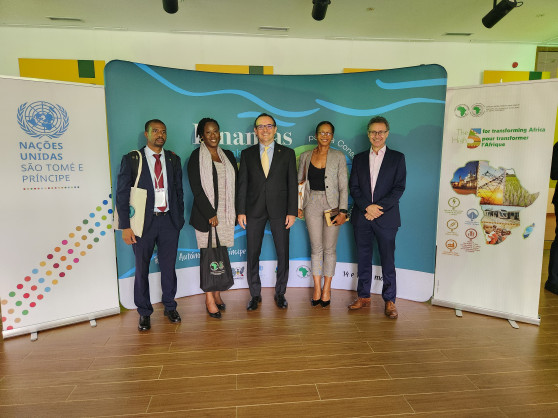The UNESCO biosphere reserve of Príncipe island was the site of the first international conference dedicated to biodiversity financing hosted by the Government of São Tomé and Príncipe, the Regional Government of Príncipe, in partnership with the United Nations and the African Development Bank (www.AfDB.org).
Raising awareness of the challenges in mobilizing sustainable financing, the event held 14-15 March 2024, identified concrete mechanisms to generate additional financial flows anchored in biodiversity. It also showcased solutions that Mozambique, Rwanda, Seychelles and Cape Verde have found to attract innovative environmental finance and blended finance investments to support terrestrial (green) and marine (blue) conservation activities.
Participants included high-level government representatives, the diplomatic corps representatives from Cap-Verde, Equatorial Guinee, Portugal and Brazil, civil society, financial institutions, private investors, international experts, and senior representatives of the African Development Bank and the United Nations.
The island country, home to many endemic flora and fauna, counts nearly 900 registered plant species, of which around 400 are endemic.
Hosting the event on the island provided an opportunity to learn about the efforts of the Regional Government of Príncipe to protect its biodiversity. Field visits included the Abade Mangrove and the natural park of Príncipe, where biodiversity restoration and conservation are ongoing. The conference was a roadmap for sustainable blue and green financing for São Tomé and Príncipe and other small island developing states.
Opening the conference, Prime Minister Patrice Trovoada praised the African Development Bank and the United Nations for their support to its organization. “From a global point of view, without adequate financing, and restructuration and coordination of multilateral and innovative financing mechanisms, we will continue jeopardizing the biodiversity and all essential ecosystems required for our collective well-being,” Trovoada said.
Speaking on behalf of African Development Bank President Akinwumi Adesina, Pietro Toigo, Country Manager for São Tomé and Príncipe said, “Turning natural capital into financial flows that can be deployed for development is a key plank of a just climate settlement; the African Development Bank is committed to avail its financial expertise and capital to provide innovative solutions for nature-rich African countries like São Tomé and Príncipe.”
Minister of Finance, responsible for entrepreneurial development and the digital economy of Cabo Verde, Olavo Correia said, “It is fundamental to address climate change as an emergency, bringing scale and speed, and creating impact for people, in particular youth and women”.
Several African countries have experience with innovative financing vehicles — the Seychelles debt for nature swap and blue bond issuance, the impact investment and conservation funds of Mozambique and Rwanda, and the soon-to-be established São Tomé and Príncipe Fund for Biodiversity. The overarching message for mobilizing biodiversity financing from donors and private sector: African countries must have a coherent policy framework and governance environment to establish clearly dedicated and independent resource mobilization vehicles and to insist on good governance, accountability, commitment and transparency to ensure sustainable conservation activities.
The African Development Bank has set and achieved ambitious targets for climate finance with its 2018 commitment to invest at least 40% of its total lending program in climate-related activities, and at least half in adaptation. In 2023, 55% of its lending program was in climate finance of which 56% was invested in mitigation and 44% in adaptation. In 2023, the Bank lent $10.6 billion overall, of which $5.8 billion was climate finance.
During panel presentations, African Development Bank staff highlighted its increasing support in addressing climate action through the launch and operationalization of the Climate Action Window under the 16th replenishment of the African Development Fund, its various fiduciary funds, risk mitigation structures such as partial credit guarantees to de-risk capital market transactions against Sustainable Financing Frameworks, among other initiatives. Gareth Philips, Manager of the Climate and Finance Division at the Bank, announced financing for the first phase of the UN’s Adaptation Benefits Mechanism (https://apo-opa.co/3v97No0), an innovative mechanism for mobilizing new and additional public and private sector finance for enhanced climate change adaptation action being piloted in selected African countries.
Distributed by APO Group on behalf of African Development Bank Group (AfDB).
Contact:
Communication and External Relations Department
Email: [email protected]

